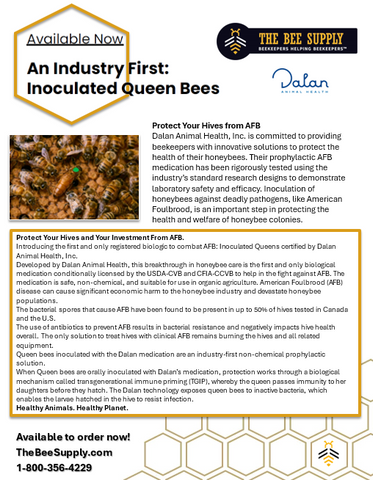THE SCIENCE BEHIND AFB-INOCULATED QUEENS
You've probably seen it on the news― queen bees that are 100% resistant to AFB! Blake sat down with Amy Floyd of Dalan to learn more about the incredible AFB-proof queens. Amy did an incredible job of diving into the practical science of how these innovative new discoveries are benefiting bees and queens. And it was pretty amazing to hear about some additional new innovations in this area being studied!

Video transcript summary:
-
00:01 🐝 Introduction to Dalen's work on inoculating Queens against American foul brood (AFB)
- Discussion on Dalen's groundbreaking research in inoculating Queens to resist AFB.
- Overview of the journey from news story to market reality for the AFB vaccine.
- Blake's anticipation and community interest in the vaccine's mechanics, benefits, and long-term implications.
-
03:32 Amy's background and Dalen's foundation
- Amy Floyd's background and involvement with Dalen's research and development.
- Dalen's inception, growth, and focus on innovative solutions for honeybee health.
- Amy's collaboration with Dalen and transition to joining the team, emphasizing the company's mission and growth.
-
06:34 Dalen's impact and expansion
- Recognition and awards for Dalen's innovative AFB vaccine.
- Founding members of Dalen and the company's growth to a team of 15.
- Dalen's base in Athens, Georgia, and commitment to sustainable solutions for bee health.
-
08:45 Honeybee stressors and the significance of AFB
- Overview of stressors affecting honeybees, including diseases, pests, environmental factors, and pesticides.
- Discussion on the global spread and impact of American foul brood (AFB).
- Challenges beekeepers face in managing AFB outbreaks and limitations of current treatment options.
-
15:15 Understanding honeybee immune system and transgenerational immune priming (TGIP)
- Explanation of honeybee immune system functioning at both individual and colony levels.
- Introduction to transgenerational immune priming (TGIP) and its significance in passing immunity from Queens to offspring.
- The role of vitellogenin and recognition receptors in facilitating TGIP and vaccine effectiveness.
-
19:22 Dalen's AFB vaccine: Mechanics and application
- Details of Dalen's AFB vaccine, including its composition and regulatory approval.
- Application process involving mixing the vaccine into Queen candy and its pathway through worker bees to Queens.
- Emphasis on the vaccine's natural, chemical-free nature, and its suitability for organic beekeeping practices.
-
21:09 Tracking Vaccine Particles in Bees' Digestive System
- Vaccine particles marked with fluorescence tracked through worker bees' digestive system.
- Confirmation of vaccine particles reaching the hypopharyngeal glands, crucial for feeding the queen.
-
24:16 Ensuring Safety and Efficacy of the Vaccine
- Conditional license obtained from USDA after proving safety, efficacy, purity, and batch consistency.
- Field trials conducted to assess survival rates of vaccinated larvae and queens, with positive outcomes.
- No reported cases of AFB after introducing vaccinated queens into commercial operations.
-
28:49 Potential Benefits and Distribution of the Vaccine
- Anecdotal feedback from beekeepers suggests improved hive balance and productivity with vaccinated queens.
- Options for obtaining the vaccine include ordering vaccinated queens or purchasing the vaccine for self-vaccination.
- Ongoing research aims to explore additional benefits and expand distribution beyond the US and Canada.
-
43:33 Vaccination Process and Queen Selection
- The vaccination process involves exposing a mated, caged Queen to vaccinated royal jelly.
- The ideal Queen for vaccination is already mated and has developed ovaries.
- Only mated Queens should be vaccinated before introduction into a hive.
-
45:01 Development and Efficacy of the Vaccine
- The vaccine was developed due to the existence of American foulbrood (AFB) in hives.
- Efficacy studies involved exposing larvae to pathogenic AFB spores to assess effectiveness.
- Vaccinated Queens were not incorporated into commercial operations earlier due to resource limitations.
-
46:11 Vaccine Residue and Hive Environment
- No vaccine residue is introduced into hives as the vaccination process occurs away from them.
- The vaccine consists of dead bacteria and does not leave any residue in the hive.
- AFB spores can exist in the hive environment naturally, minimizing the introduction of foreign substances.
-
47:04 Implementation and Cost of Vaccination
- Requeening all hives before vaccination is recommended to avoid complications.
- Vaccinating all hives and Queens is technically feasible but may require significant logistical planning.
- The vaccine primarily serves as a preventative measure against AFB outbreaks.
-
48:41 Managing Infected Hives and Hive Health
- The vaccine's purpose is preventive; it aims to stop AFB infections rather than treat existing ones.
- Best management practices include burning heavily infected hives to eliminate AFB spores.
- AFB presence in hives may act as a low-level stressor, potentially improving overall hive health.
-
49:28 Immune Priming and Hive Health Improvement
- Low-level exposure to AFB may prime the colony's immune system, leading to improved hive health.
- Beekeepers may observe healthier and more balanced hives after vaccinating Queens.
- Enhanced immune response may prevent subclinical infections from developing into full outbreaks.

